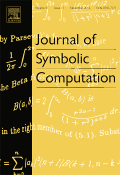
JOURNAL OF SYMBOLIC COMPUTATION
Scope & Guideline
Catalyzing Discoveries in Computational Methodologies
Introduction
Aims and Scopes
- Symbolic Computing Algorithms:
The journal emphasizes the development and analysis of algorithms that manipulate mathematical expressions symbolically rather than numerically, enabling exact computations. - Algebraic Structures and Computation:
Research on algebraic structures, such as rings, fields, and modules, is a core focus, exploring how these can be effectively manipulated and utilized in computations. - Applications of Symbolic Computation:
The journal highlights applications of symbolic computation in various domains, including algebraic geometry, combinatorics, and optimization, showcasing its practical relevance. - Interdisciplinary Approaches:
Papers often bridge symbolic computation with other areas such as machine learning, cryptography, and computational biology, reflecting the journal's commitment to interdisciplinary research. - Theoretical Foundations:
Theoretical contributions that enhance the understanding of symbolic computation, including complexity analysis and formal verification techniques, are also a significant aspect of the journal.
Trending and Emerging
- Machine Learning Integration:
There is a growing trend of integrating machine learning methods with symbolic computation, focusing on applications that enhance algorithmic efficiency and predictive capabilities. - Advanced Algebraic Geometry:
Research in advanced algebraic geometry, particularly involving computational techniques and symbolic methods, has gained traction, reflecting the increasing complexity of problems being addressed. - Quantum Computing Approaches:
Emerging studies are exploring the intersection of symbolic computation and quantum computing, indicating a significant interest in developing algorithms suitable for quantum environments. - Optimization and Decision-Making:
There is an increasing focus on optimization problems and decision-making processes, with symbolic computation being applied to derive efficient solutions in various contexts. - Symbolic Dynamics and Complexity:
The exploration of symbolic dynamics and its complexity aspects is gaining attention, reflecting a broader interest in understanding the computational limits and capabilities of symbolic systems.
Declining or Waning
- Purely Numerical Methods:
There has been a noticeable decrease in publications focused solely on numerical methods, as the journal increasingly prioritizes symbolic and algebraic approaches. - Basic Polynomial Algebra:
Research on elementary polynomial algebra techniques appears to be waning, possibly due to the maturation of these topics and a shift towards more complex applications and theories. - Classical Computational Geometry:
While still relevant, classical computational geometry topics have seen fewer submissions, as researchers explore more advanced geometrical methods and applications in symbolic computation. - Non-symbolic Algorithm Comparisons:
Papers that primarily compare symbolic and non-symbolic algorithms without offering new insights or methodologies have become less frequent, indicating a shift towards more innovative contributions.
Similar Journals
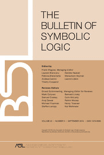
BULLETIN OF SYMBOLIC LOGIC
Exploring the Depths of Symbolic ThoughtBULLETIN OF SYMBOLIC LOGIC, published by Cambridge University Press, is a distinguished academic journal that serves as an essential platform for the dissemination of research in the realms of logic and philosophy. Since its inception in 1995, this journal has progressed through its convergence years and remains committed to fostering intellectual discourse among scholars. With a 2023 ranking in the Q1 category of Philosophy and a Q3 classification in Logic, it continues to uphold its reputation as a significant contributor to the field. While operating under a traditional subscription model, the journal dedicates itself to publishing high-quality articles that explore foundational issues, advanced theories, and innovative insights in symbolic logic. Researchers, professionals, and students will find invaluable resources within its pages, particularly as it ranks favorably among peers, with noteworthy standings in Scopus rankings. For those seeking to deepen their understanding of logical frameworks and their philosophical implications, BULLETIN OF SYMBOLIC LOGIC is an indispensable resource.

Japanese Journal of Mathematics
Bridging Theory and Application in MathematicsThe Japanese Journal of Mathematics, published by SPRINGER, stands as a premier platform for the dissemination of high-quality research in the field of mathematics. With its ISSN 0289-2316 and E-ISSN 1861-3624, this prestigious journal has been continually contributing to the academic community since its inception. Spanning a broad range of mathematical disciplines, the journal enjoys a strong reputation, recognized in the 2023 category quartiles as Q1 in Mathematics (miscellaneous), placing it among the top-tier journals in the field. Its Scopus rank of #41 out of 399, which reflects an impressive 89th percentile, further underscores its influence and the quality of articles it publishes. The Japanese Journal of Mathematics is dedicated to fostering scholarly exchange and advancing mathematical research, making it an indispensable resource for researchers, professionals, and students alike. Although it does not offer open access, its comprehensive archives provide a wealth of knowledge for those seeking to deepen their understanding of mathematical theories and applications.

Computation
Championing rigorous research for a digital future.Computation, published by MDPI, is an esteemed open-access journal that has been contributing to the fields of applied mathematics and computer science since its inception in 2013. With an E-ISSN of 2079-3197, this Swiss-based journal operates under a philosophy of free knowledge dissemination, allowing researchers, professionals, and students globally to access high-quality content without financial barriers. Recognized for its rigorous peer-review process, Computation is currently categorized in the Q2 and Q3 quartiles across significant domains, including Applied Mathematics (#181/635), Theoretical Computer Science (#52/130), and Modeling and Simulation (#138/324). As it converges towards 2024, the journal continues to attract innovative and impactful research aimed at advancing theoretical frameworks and practical applications within these disciplines. Joining the Computation community not only enriches individual research portfolios but also contributes to the broader conversation on computational methodologies and their applications in solving real-world problems.

ALGORITHMICA
Shaping the Future of Algorithmic Research and DevelopmentALGORITHMICA is a premier academic journal published by SPRINGER, dedicated to the field of algorithms and their applications across various domains. With an ISSN of 0178-4617 and an E-ISSN of 1432-0541, this journal serves as a vital resource for researchers and practitioners interested in the theoretical and practical aspects of algorithmic design and analysis. Recognized for its high impact, ALGORITHMICA is listed in the top quartile (Q1) for Applied Mathematics and Computer Science (miscellaneous) and is positioned in Q2 for Computer Science Applications in the 2023 category rankings. The journal has continuously contributed to advancing knowledge from its inception in 1986 to its ongoing publications through 2024. With a commitment to rigorous peer review and high-quality research, ALGORITHMICA is essential for anyone serious about pushing the boundaries of algorithmic study and application.
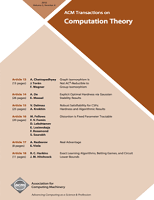
ACM Transactions on Computation Theory
Driving Innovation in Computational Theory and Mathematics.ACM Transactions on Computation Theory, published by the Association for Computing Machinery, is a prestigious journal dedicated to advancing the field of computation theory and theoretical computer science. With an ISSN of 1942-3454 and an E-ISSN of 1942-3462, this journal serves as a vital resource for researchers and professionals seeking to explore groundbreaking developments in computational models, algorithms, and their mathematical foundations. The journal's rigorous standards have earned it a significant position within the academic community, as evidenced by its 2023 category quartiles, ranking in the Q1 category for Computational Theory and Mathematics and Q2 for Theoretical Computer Science. Although it operates through traditional subscription access, it maintains a critical role in disseminating cutting-edge research and fostering collaboration among experts in the United States and beyond. As an influential platform, ACM Transactions on Computation Theory is committed to contributing to the ongoing dialogue and advancement of computation theory, making it essential reading for anyone passionate about this dynamic field.

FOUNDATIONS OF COMPUTATIONAL MATHEMATICS
Fostering collaboration through groundbreaking mathematical insights.Foundations of Computational Mathematics, published by Springer, is a premier journal dedicated to the advancement of research in the field of computational mathematics. With an impressive impact factor attributable to its rigorous peer-review process and high-quality publications, this journal is recognized globally, featuring in the prestigious Q1 quartile across various categories including Analysis, Applied Mathematics, Computational Mathematics, and Computational Theory and Mathematics. With a commitment to fostering innovative research, the journal welcomes original research articles, reviews, and notes that contribute to the theoretical foundations and practical applications of computational methods. Its Scopus rankings reflect its significant standing in the academic community, providing an essential platform for scholars, researchers, and students to disseminate their findings and engage with groundbreaking mathematical advances. For those seeking to stay at the forefront of the discipline, Foundations of Computational Mathematics offers invaluable insights and is a critical resource for fostering intellectual discourse and collaboration.

Beitrage zur Algebra und Geometrie-Contributions to Algebra and Geometry
Exploring the Depths of Algebra and GeometryBeitrage zur Algebra und Geometrie - Contributions to Algebra and Geometry is a distinguished journal published by Springer Heidelberg, situated in Germany. With a focus on the intricate fields of Algebra and Number Theory and Geometry and Topology, this journal serves as a pivotal platform for the dissemination of innovative research and critical insights from scholars worldwide. Holding a commendable Q3 category ranking in both disciplines as of 2023, it is recognized for its contribution to advancing theoretical foundations and practical applications. The journal has consistently engaged the mathematical community since its inception in 2000, with a specific publication timeline that spans 2000 to 2002 and 2004 to 2024. Despite its absence of open-access options, the journal's articles are pivotal for researchers, professionals, and students seeking authoritative and impactful studies in algebra and geometry. Join an esteemed readership eager to explore and expand upon the boundaries of mathematical inquiry through this exceptional publication.
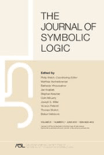
JOURNAL OF SYMBOLIC LOGIC
Exploring the Frontiers of Logic and PhilosophyThe JOURNAL OF SYMBOLIC LOGIC, published by Cambridge University Press, stands as a leading platform for scholarly discourse in the realms of logic and philosophy. With a rich history dating back to 1938, this esteemed journal is dedicated to presenting cutting-edge research that pushes the boundaries of knowledge within symbolic logic and its applications. In 2023, it proudly holds a distinguished Q1 ranking in both Logic and Philosophy categories, reflecting its high impact and relevance in the academic community. Researchers and academics benefit from its rigorous peer-review process and contributions from leading scholars worldwide, ensuring the dissemination of high-quality research and critical theories. While the journal currently does not operate under an open access model, it remains a pivotal resource for professionals seeking to deepen their understanding of logical theories and philosophical inquiries. Explore the JOURNAL OF SYMBOLIC LOGIC to engage with scholarly articles that challenge conventional thought and inspire future research.
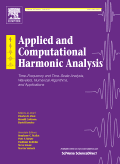
APPLIED AND COMPUTATIONAL HARMONIC ANALYSIS
Exploring Computational Techniques for Modern ChallengesAPPLIED AND COMPUTATIONAL HARMONIC ANALYSIS is a leading journal in the field of applied mathematics, published by Academic Press Inc Elsevier Science. With an impressive impact ranking reflected in its Q1 quartile status and a Scopus rank of #84 out of 635 in Applied Mathematics, the journal highlights significant advancements and innovative applications of harmonic analysis and computational techniques. Established in 1993 and continuing through 2024, it offers a platform for researchers and professionals to publish high-quality original research and review articles. Although it does not operate under an open access model, the journal's rigorous peer-review process ensures that only the most impactful research is disseminated, making it an essential resource for students and scholars alike. By facilitating a deeper understanding of both theoretical and practical aspects of harmonic analysis, this journal plays a crucial role in furthering academic dialogue and collaboration within the mathematical community.

PROGRAMMING AND COMPUTER SOFTWARE
Elevating the Standards of Programming Knowledge Since 1978PROGRAMMING AND COMPUTER SOFTWARE is a distinguished journal committed to advancing the field of software development and programming methodologies. Published by PLEIADES PUBLISHING INC, this journal has been a valuable resource since its inception in 1978, reaching out to researchers, professionals, and students alike. With an emphasis on rigorous peer-reviewed articles, the journal holds a Q3 ranking in the realm of Software according to the latest 2023 Category Quartiles. Though it does not offer open access, the journal ensures that high-quality research is disseminated to its audience, providing insights into evolving programming techniques, software engineering challenges, and innovative solutions. With its convergence of years extending to 2024, PROGRAMMING AND COMPUTER SOFTWARE remains a pivotal publication, fostering a deeper understanding of the complexities in computer programming while supporting the broader software community.